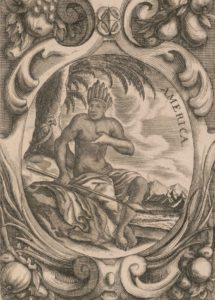
We Are More American Than We Think
Liberté, égalité, fraternité (“Liberty, equality, fraternity”)
E pluribus unum (“Out of many, one”)
Life, liberty, and the pursuit of happiness
These famous mottos from France and the United States succinctly embody and convey our idea of democracy. They all came out of revolutions—the French Revolution of 1789 and the American Revolution of 1776—that overturned long-held European beliefs about social order and placed political power in the hands of the people as opposed to monarchs and heredity.
The very idea that people could determine their own fate and take responsibility for installing their own form of government is traditionally associated with the Enlightenment, a period when a group of French and British writers in the late-seventeenth and eighteenth centuries began to challenge political orthodoxy and philosophize about new ways to think about what it means to be human. These ideas turned out to be so powerful that they continue to set the standard for how we measure political systems and social life today. The United States was the first Western country to manifest Enlightenment thought into a working political system, with France following close behind, so many of these ideas are closely associated with America. Even so, we generally do not recognize how truly American the origin of these ideas are.
Ideas about liberty, social equality, and the ability of people to self-determine their common future together did not simply spring out of the heads of philosophers like Jean-Jacques Rousseau, John Locke, and David Hume—and just happened to do so all at roughly the same time. If they did, the authorities most likely would have quickly recognized their radical nature and put down the individuals who came up with them. Instead, these ideas circulated widely in European salons, coffee houses, and staged debates over a long period of time. And the true origins of these ideas go back even further in time, to when Europeans first came into contact with the indigenous people who populated what we now call America.
This convincing claim is made at the beginning of David Graeber’s and David Wengrow’s The Dawn of Everything: A New History of Humanity, a mammoth book that seeks to reframe the standard narrative about humanity’s political origins. This standard narrative generally traces civilization back to our supposed evolution from hunting and gathering to farming and agricultural, which in turn supported the growth of complex cities. The two authors question the use of many of the terms in this narrative—such as evolution, complexity, and the linking of agriculture to the growth of cities—and they show how this overarching narrative tends to infantilize early people, people who in reality were fully-developed human beings just like ourselves. Once we abandon the storyline that agriculture was a necessary pre-condition for the development of cities and civilization, we begin to see the true complexity of early political systems. These systems not only took on many different forms over time—as if humanity has been engaged in one political experiment after another—but in some cases the forms changed from season to season within a given year, with a strong, centralized rule during parts of the year when it was needed and a decentralized one at others.
Back in the seventeenth century, French Jesuit missionaries had long conversations and debates with indigenous Americans about their differing worldviews, and the accounts of these conversations became bestsellers back in Europe (and were later read by Enlightenment thinkers). Europe’s highly stratified social hierarchy was so rooted in the minds of the Jesuit missionaries that concepts of liberty, freedom, and equality expressed by indigenous Americans were completely new to them and considered dangerous. In the debates, the Jesuits did not question that these native people generally lived in freer societies—they clearly did—but they did question whether such freedom and individual liberty was desirable. From these debates emerged the indigenous critique of European culture, a critique that not only influenced Enlightenment thought but was a precondition for such thinking even to take place. In other words, fundamental concepts of Enlightenment thought, concepts that we take for granted today, did not exist in Europe until European contact with indigenous Americans.
In fact, Graeber and Wengrow claim that if you and I, as Western thinkers, read the multi-volume accounts of these seventeenth-century debates today, the ideas of indigenous Americans, which include personal freedom, equality between the sexes, the importance of the environment, and even depth psychology, would be more familiar to us than those of the Europeans. Seventeenth-century Jesuits saw individual liberty—an idea that we, who live in a liberal democracy, now hold as a sacred value—as animalistic and a threat to social order, so perhaps contrary to our expectations they are the ones who would come off to us as alien creatures from another planet if we read the debates today.
France will soon be celebrating Bastille Day on July 14 and the United States the Fourth of July. But none of the events that these days commemorate would have taken place without exposure to the worldviews of Native American and their ideas about freedom, equality, and sovereignty. Our American idea of who we are as a country, it turns out, is more American than we even thought. Perhaps we need to take a closer look at the complex politics and social structures of indigenous Americans to understand who we truly are as a people and how we may want to move forward in the future.
—Anthony Vaver, Local History Librarian
Suggested Reading:
- The Dawn of Everything: A New History of Humanity by David Graeber and David Wengrow.
- 1491: New Revelations of the Americas Before Columbus by Charles C. Mann.
- The First North Americans: An Archaeological Journey by Brian Fagan.
- The Enlightenment: And Why It Still Matters by Anthony Pagden.
* * *
Read All About Westborough
Want to know more about Westborough history? Read a book! You can find a list of books about Westborough on the Westborough Archive website, many of which are available online. They may not qualify as summer beach reading, but they can teach you more about your town and its history.
* * *
Nature Notes: June
A rabbit recently ate the flowers off the perennials I newly planted this spring. But did an Eastern cottontail eat them or a New England cottontail? I don’t know, but Annie Reid’s article on cottontail rabbits may help me figure out the true culprit. You can learn the difference between these two kinds of rabbits and more about Westborough’s fauna and flora in Annie Reid’s Nature Notes for June.
* * *
Did you enjoy reading this Westborough Center Pastimes newsletter? Then subscribe by e-mail and have the newsletter and other notices from the Westborough Center for History and Culture at the Westborough Public Library delivered directly to your e-mail inbox.
You can also read the current and past issues on the Web by clicking here.


Dear WPL: I want to thank you for introducing me to this theory that the Enlightenment derived from the North American Indigenous People (NAIPs). I was taught that the Enlightenment was based on the thoughts of ancient Greek philosophers, but I was not persuaded.
I have long been interested in the moral philosophy of NAPIs, based on conversations with some German friends, who hold NAIPs and their social structures and philosophies in very high regard. The model proposed in your article makes so much sense.
If I might, I have a thought to add. You suggested that the French missionaries who reported the finding to Europe were very negatively critical of the NAIPs, and that negativity was sincere. Having spent significant time being educated by a missionary order at St John’s, I propose a slightly different interpretation of the facts.
If the French missionaries sincerely disapproved of the NAIPs, those missionaries would not have gone to the considerable trouble of reporting their findings in detail.
Rather, perhaps they wanted to report the details of their remarkable discoveries without incurring the wrath (and censorship) of the unenlightened political and religious European establishment of the times. By casting the discoveries in a false negative light, the reporters could publish their discoveries, without incurring the wrath of the establishment. I have successfully used this technique more than a few times in my life as a discusser and lawyer; essentially a variation in the “Trojan Horse” gambit.
Thank you, again for the enlightenment.
Gerry
Thank you, Gerry, for your thoughtful response to my article. I wouldn’t totally rule out the influence of ancient Greek philosophy on Enlightenment thought. It clearly had a role–or at the very least they thought it did. The main point is that exposure to North American indigenous thought and philosophy made the ideas of this new European philosophy possible, if not influenced it directly.
I also suspect that you are right about the position of the French missionaries. I haven’t read the missionary reports, nor am I that familiar with Jesuit teachings–I was merely trying to summarize David Graeber and David Wengrow’s position on the topic. As in the case of influences on Enlightenment thought, the full story is most likely more complicated, and your insight sounds plausible to me.
Best,
Tony
Thank you for the fresh perspective (for me) on the American values of Life, Liberty and individual freedom. I hadn’t realized that our values can be traced to the indigenous people who lived here first – the original Americans.
And news to me, until I read “The Dawn of Everything”! As a country, we seem to have lost sight of what these terms truly mean, along with their inherent limitations. Wouldn’t it be interesting to revisit their origins to see what doing so can teach us and how it might give us some guidance moving forward?
Best,
Tony